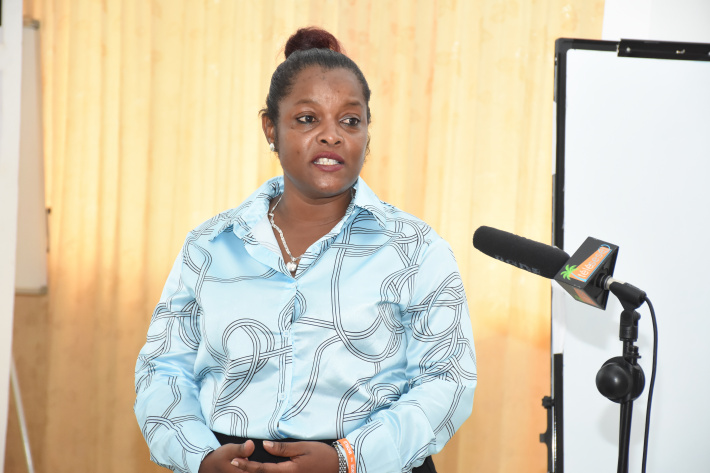Family department organises series of talks and activities
To mark Orange Day this year, the Family department in the Ministry of Youth, Sports and Family is organising a series of talks and activities to advocate and raise awareness towards alleviating all forms of violence.
The Orange Day Campaign: Say No to All Forms of Violence is a strategy used by the Ministry of Youth, Sports and Family to highlight the issue of violence, especially against women and girls, and to call for a peaceful, violence-free society.
Orange Day is observed every 25th of each month and individuals are encouraged to wear orange outfits or accessories on this particular day to demonstrate solidarity in eliminating all forms of violence. The colour orange symbolises a brighter future, free of violence.
For the first event, the Family department brought together human resources professionals from different workplaces in a workshop held at the Care House, Freedom Square on Wednesday. The workplace is a space where co-workers can identify signs of a victim of violence with some cases where the situation escalates at the workplace itself. It is crucial for HR professionals to learn about gender-based violence (GBV) and how to better assist an individual otherwise this may result in damage to an organisation’s resources or capabilities.
What can employers do to protect their workers from becoming victims of workplace violence? The ultimate goal is to deter disgruntled insiders or nefarious outsiders from violence by making your company a hard target.
Nathalie Didon, principal programme development officer in the Programme Unit of the Family department, explained that GBV are harmful acts directed at an individual based on their gender. It is rooted in gender equality, the abuse of power and harmful norms. The types of abuse are: (1) Verbal Abuse, (2) Physical Abuse, (3) Emotional Abuse, (4) Sexual Abuse and (5) Economic harm.
“The main causes of violence in Seychelles are associated with drug and alcohol abuse, infidelity, role control, gambling and mental illness. The effects are the victims have physical injuries, long-term mental health disorders such as anxiety, depression and post-traumatic stress disorder, becoming withdrawn, lack of sleep, alcohol or substance misuse, changes in behaviour, inappropriate behaviour and suicide attempt,” explained Ms Didon.
Violence is unfortunately on the increase. The recent figures for 2022 are still being worked on but figures from 2020 and 2021 already show the increase (See accompanying table).
What is being done to sensitise more people on this issue? Ms Didon noted that their unit is on the field and they organise national forums, symposiums, school competitions – logo, poster, poems, mass media campaigns – radio talks, TV spots, publication of articles, commemorative mass among others.
GBV outreach also take place on Praslin and La Digue.
The Programme Unit also has a few challenges in discharging its mandate, shared Ms Didon.
“First of all, Seychelles still does not have a domestic violence shelter to provide safety home for women, men and children in transition. We lack regular and consistent data collection in our database system for local and international reports. We also lack manpower in the secretariat and there is a lack of commitment from partners in setting up committees. There is also a lack of training for the service providers e.g., judges, prosecutors, the police and law enforcement, and medical personnel on standardised gender-sensitive procedures for dealing with victims of violence against women and effectively investigating complaints,” noted Ms Didon.
GBV is not something to be taken lightly. According to the national baseline study for GBV in 2016 in partnership with National Bureau of Statistics and Gender links, about 58% of women have experienced GBV in their lifetime; 54% of women and 35% men experience intimate partner violence and 18% of women and 14% of men experience sexual harassment at school, the workplace or in public places.
In the Economic cost of violence against women and girls – ECONWAG (2019) the findings revealed that the Seychelles economy loses about 1.2% of GDP or R235.7 million for the cost of a typical case and 4.6% of GDP or R839.13 million for the economy wide.
If you or someone you know is in an unsafe situation please do not hesitate to contact one of the following institutions/agencies: Family Tribunal, Social Affairs department, Family department, Health ministry, the Police and Citizens Engagement Platform Seychelles (Ceps).
Jimmy Petrousse was also one of the main animators of the programme.
Courtesy: Vidya Gappy (Nation.sc)


